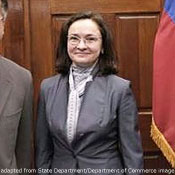Nabiullina Likely to Pursue Dovish Policy, Yield to Political Pressure

(Moscow Times – themoscowtimes.com – Howard Amos – March 14, 2013)
Asked to end speculation about the identity of the next chairman of Russia’s Central Bank, President Vladimir Putin promised an “unexpected” candidate who would be well received.
When it did come, the announcement that presidential adviser and former Economic Development Minister Elvira Nabiullina would fill the post was a surprise for businessmen, analysts and investors but it was not universally well received.
Experts and acquaintances of Nabiullina, 49, said she was likely to follow a more dovish monetary policy after Putin revealed his choice late Tuesday. They also highlighted her newness to the art of central banking.
“She has managed a large staff solving many and varied problems,” said former Deputy Central Bank Chairman Sergei Aleksashenko. “But she has never tackled the concrete tasks [of the Central Bank]. … Maybe she’ll cope, maybe she won’t.”
Others were more blunt about her apparent lack of relevant experience.
“It is hard to see what credentials Elvira Nabiullina has in order to run the Central Bank,” Renaissance Capital chief economist Ivan hakarov wrote in a note to investors.
Current Central Bank Chairman Sergei Ignatyev was appointed in 2002 and is known for his commitment to cutting inflation, as well as political independence and reticence about talking to the media.
Nabiullina’s candidacy will be proposed by March 24 to the Duma, where the support of the United Russia party means it is certain to be approved. She will formally replace Ignatyev in June.
An economist by training, Nabiullina has spent most of her career, with the brief exception of a yearlong stint in banking, in government service and advisory positions.
“I have known her for a long time, and I know that she is a professional of the highest level,” said Anatoly Aksakov, a Duma deputy and president of the Russian Association of Regional Banks.
“She is a democratic centralist,” he added, referring to the Leninist principle of party management. “She listens to everyone and then makes a decision.”
Another hallmark of Nabiullina’s career has been her proximity to Putin. After serving in his Cabinet between 2007 and 2012, she followed him to the Kremlin in March last year.
This proximity has generated a fear among experts that the Central Bank will be more vulnerable to political pressure to cut interest rates and stimulate growth in Russia’s flagging economy.
“The only minus her intimacy with the president and the government puts a big question mark over the independence of the Central Bank,” ING chief economist Dmitry Polevoi wrote in a note to investors.
Nabiullina was born to a working family in Ufa and is married to the rector of the Higher School of Economics, Yaroslav Kuzminov. She will be Russia’s second female Central Bank chairman and one of the few women in the world leading a central bank.
Her gender became wrapped up in analysis of her candidacy Wednesday.
“The responsibility for the money of a big country … requires male brains,” said Liberal Democrat Party leader Vladimir Zhirinovsky, RIA-Novosti reported.
But others suggested that Nabiullina’s femininity could be an advantage.
“[She] has a wealth of experience and, I would say, a sufficiently unique combination of female intuition and male character,” said Andrei Belousov, who succeeded Nabiullina at the Economic Development Ministry last year, Rossia-24 reported.
Nabiullina’s relative inexperience means that it is unlikely her appointment will precipitate a major reshuffling of senior officials at the Central Bank, observers said.
First Deputy Central Bank Chairman Alexei Ulyukayev, who was the favorite to replace Ignatyev until Nabiullina’s candidacy emerged last week, said Wednesday that he had no plans to leave, Reuters reported. Ulyukayev’s term at the Central Bank expires in 2016.
Nabiullina’s selection comes at a critical moment for the Central Bank, which emerged in its present form after the fall of the Soviet Union.
Ignatyev is respected for his success in bringing down inflation from double-digit figures a decade ago, and Nabiullina will be expected to balance a continuation of his inflation fighting with tackling sluggish economic growth rates.
She will also oversee the creation of a “super-regulator” as the merger of the Central Bank and the Federal Service for Financial Markets begins later this year.
Tinkering with financial regulation in Russia is known as a dangerous occupation. Ignatyev’s former deputy with responsibility for banking supervision, Andrei Kozlov, was assassinated in 2006.
“Nobody knows what this mega-regulator will look like,” said former central banker Aleksashenko. “The tasks are enormous.”
